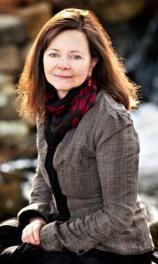Author Talk: October 22, 2015
Geraldine Brooks is the author of five novels, including the Pulitzer Prize-winning MARCH, and two acclaimed works of nonfiction. Her latest book, THE SECRET CHORD, provides context for arguably the most fascinating and romantic man in the Bible: King David. Here she revisits some of the best-known episodes of David’s life, vividly reimagining him through the eyes of those who love him or fear him most. In this interview, Brooks discusses why she’s compelled to write about people whose faith defined their lives. She also opens up about the challenges of defamiliarizing such recognizable biblical characters and what David’s story can teach readers today.
Question: Humanity’s relationship with God is a major theme in your books. How would you describe your own faith, and how does it drive your work?
Geraldine Brooks: I’m interested in believers and in what faith does for us and to us. As a foreign correspondent in the Mideast, I witnessed firsthand the excesses born out of fanatical belief, and I draw on those experiences to imagine the past, when faith was often the defining essence of day-to-day existence. I’m drawn to the human quest for meaning. I like asking the questions. I haven’t found the answers.
Q: Have any fragments of the real book of Natan ever been discovered? Do scholars believe it to be a biography of David?
GB: All we know about it are the two mentions in Chronicles that I have used as epigraphs to the novel. Some scholars posit that Natan’s book might have been incorporated into the accounts in Samuel, but I like to think it’s out there somewhere, sealed in a clay jar, buried deep in the caves of Qumran.
Q: Are there any other reasons you chose Natan to be the narrator of this novel?
GB: I’m drawn to the Hebrew prophets, these ardent truth tellers who faced the elite of their society and brought unwelcome messages. Abraham Heschel described “their breathless impatience with injustice” and called them some of the most difficult people who ever lived, “facing man, faced by God.”
Q: Throughout the book, you refer to God only as “the Name.” Why is this?
GB: There’s a risk, in writing about David, that he feels too familiar to us. All the famous artworks --- Renaissance, Mannerist, modern --- that have portrayed him as somehow a man recognizable to their own time. Yet he is not familiar. He’s a man of the Second Iron Age, a vastly different world. He’s a devotee of a faith that neither visualizes its deity nor names it. I used the term “the Name” to remind us of that distance. That’s also the reason I used the less familiar Hebrew names --- Yishai rather than Jesse, Shmuel rather than Samuel. Jesse and Samuel sound like pupils at my son’s middle school. I didn’t want that.
Q: Which character did you find easiest to create? Which was the most challenging?
GB: I loved reimagining the story of Mikhal. Her love for David, the huge risk she takes to save him from her father, the terrible retribution the king then exacts for that betrayal, and all that follows --- this powerful story is told in a handful of lines in the Bible. Marvelous lines, to be sure, but very few. Putting in the missing passion, the rage, the bitterness --- that was very satisfying.
I think David himself is always going to be the most challenging because he embodies so many contradictions. My struggle was to bring balance to all his contrasting traits, all the lights and shadows of his nature.
Q: Some readers might be surprised to learn about David’s passionate love affair with Yonatan. Is the “fact” of his bisexuality widely known?
GB: On this point, all I can say is, read the account in the books of Samuel and the psalm Song of the Bow. There was only one conclusion I could draw from that material. Others may have a different view.
Q: What can David’s story teach readers today? Why is his legacy still important?
GB: There are myriad facets of his life that reward contemplation. He experiences everything: triumph, celebrity, exile, repudiation. Love and hatred. Children who tear apart his family and try to steal his position; a child who grows up to become a byword for wisdom and good governance. He is famous for his art, he is renowned as a fighter, he is celebrated as a nation builder. He’s a descendant of the most important biblical figures and the antecedent of Jesus. I think the question is: What do you want to learn? If it involves the experience of being human, you’ll find insight in the life of David.
Q: THE SECRET CHORD is your fifth novel and your eighth book. Has the way you work changed much since you first began writing? Do you ever regret leaving journalism to write fiction?
GB: I loved my years in journalism, and I draw on those intense experiences constantly in creating fiction. But being a novelist is very liberating. No one calls in the middle of the night telling you to get on a plane to a war zone. It’s much more compatible with raising kids.
Q: You draw so much of your inspiration from history. When you’re reading for pleasure, do you prefer history to literature? Who are some of your favorite writers?
GB: To be honest, while I read a vast amount of history for research, I don’t turn to it for pleasure. I read poetry, fiction and contemporary narrative nonfiction in about equal measures. The list of my favorite writers would consume another book.
Q: Do you have any plans for your next book?
GB: It’s a novel called HORSE, a braided narrative set in the Kentucky horse county of the 1860s, the New York art world of the 1960s, and the present. Beyond that, the deponent sayeth not.




